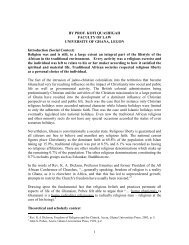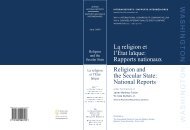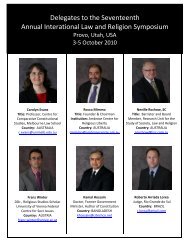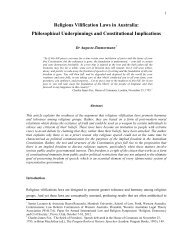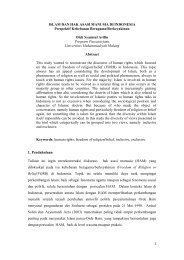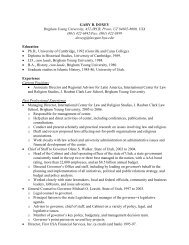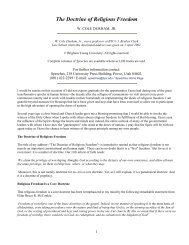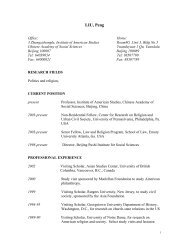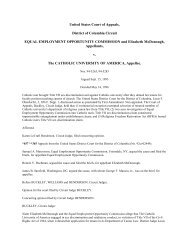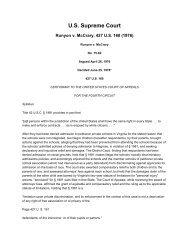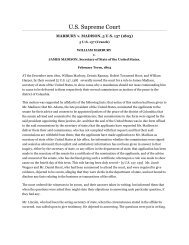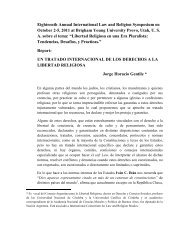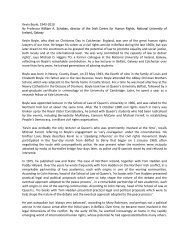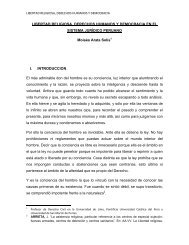Trevor Mwamba The Vice â Chancellor of the University of Ghana ...
Trevor Mwamba The Vice â Chancellor of the University of Ghana ...
Trevor Mwamba The Vice â Chancellor of the University of Ghana ...
You also want an ePaper? Increase the reach of your titles
YUMPU automatically turns print PDFs into web optimized ePapers that Google loves.
<strong>Trevor</strong> <strong>Mwamba</strong><br />
<strong>The</strong> <strong>Vice</strong> – <strong>Chancellor</strong> <strong>of</strong> <strong>the</strong> <strong>University</strong> <strong>of</strong> <strong>Ghana</strong>, Pr<strong>of</strong>essor<br />
Ernest Aryeetey;<br />
Dean; Hugh W. Colton Pr<strong>of</strong>essor <strong>of</strong> Law, J. Reuben Clark<br />
Law School, Brigham Young <strong>University</strong>, Pr<strong>of</strong>essor James R.<br />
Rasband;<br />
<strong>The</strong> Dean <strong>of</strong> <strong>the</strong> Faculty <strong>of</strong> Law, <strong>University</strong> <strong>of</strong> <strong>Ghana</strong>,<br />
Pr<strong>of</strong>essor K<strong>of</strong>i Quashigah;<br />
Your Lordship Samuel K<strong>of</strong>i Date – Bah, Justice <strong>of</strong> <strong>the</strong><br />
Supreme Court <strong>of</strong> Gambia and <strong>the</strong> Supreme Court <strong>of</strong><br />
<strong>Ghana</strong>;<br />
President <strong>of</strong> <strong>the</strong> National House <strong>of</strong> Chiefs <strong>of</strong> <strong>Ghana</strong>,<br />
Pr<strong>of</strong>essor Naa John S. Nabila;<br />
Distinguished Assembly;<br />
I am grateful to <strong>the</strong> <strong>University</strong> <strong>of</strong> <strong>Ghana</strong> and Co - Organisers<br />
for <strong>the</strong> invitation to me to deliver this Keynote Address.<br />
I am honoured and humbled and delighted to be here at <strong>the</strong><br />
<strong>University</strong> <strong>of</strong> <strong>Ghana</strong>. This eminent <strong>University</strong> is <strong>the</strong> oldest<br />
and largest <strong>of</strong> <strong>the</strong> thirteen <strong>Ghana</strong>ian universities and tertiary<br />
1
institutions. Wikipedia describes this university as “One <strong>of</strong><br />
<strong>the</strong> best universities in Africa and by far <strong>the</strong> most prestigious<br />
in West Africa.” But Wikipedia misses an important note that<br />
its prestige is also bolstered by having <strong>the</strong> former Secretary<br />
– General <strong>of</strong> <strong>the</strong> UN Dr. K<strong>of</strong>i Annan as its <strong>Chancellor</strong>!<br />
Last month I was at ano<strong>the</strong>r eminent academic institution:<br />
<strong>The</strong> London School <strong>of</strong> Economics and Political Science<br />
(LSE) one <strong>of</strong> <strong>the</strong> principal social science universities in <strong>the</strong><br />
world. I said to <strong>the</strong> staff and students <strong>the</strong>re that I could<br />
proudly say I went to LSE. Now I can add to my boast <strong>the</strong><br />
<strong>University</strong> <strong>of</strong> <strong>Ghana</strong>!<br />
<strong>The</strong> <strong>the</strong>me <strong>of</strong> <strong>the</strong> conference: “Law and Religion in Africa:<br />
Comparative Practices, Experiences and Prospects”, is very<br />
apt at this stage <strong>of</strong> Africa’s development. <strong>The</strong> <strong>the</strong>me is<br />
pr<strong>of</strong>ound and multifaceted as <strong>the</strong> papers which will be<br />
presented reflect.<br />
I am sure we shall not be groping in <strong>the</strong> dark as in this<br />
parable set in an African forest. A blind rabbit and blind<br />
snake met. And since <strong>the</strong>y could not make out who <strong>the</strong> o<strong>the</strong>r<br />
was <strong>the</strong>y decided to feel each o<strong>the</strong>r and say who <strong>the</strong>y were.<br />
So <strong>the</strong> snake went first and begun to touch <strong>the</strong> rabbit and<br />
said, “You are furly. You have long ears. You have a short<br />
2
stumpy tail. Ah! You are a rabbit. <strong>The</strong> rabbit shouted<br />
enthusiastically jumping up and down, “Yes! Yes! Yes!”<br />
<strong>The</strong>n <strong>the</strong> rabbit proceeded to touch <strong>the</strong> snake and said, “You<br />
are ra<strong>the</strong>r long and cold blooded. You have beady eyes.<br />
You have a forked tongue. You are sli<strong>the</strong>ry and have no<br />
means <strong>of</strong> self locomotion. You must be, you must be a<br />
lawyer”!<br />
Lord Denning once advised lawyers to read works <strong>of</strong> history<br />
and literature. He cited Sir Walter Scott’s novel Guy<br />
Mannering. <strong>The</strong> client Colonel Mannering goes to <strong>the</strong> lawyer.<br />
He finds <strong>the</strong> rooms <strong>of</strong> <strong>the</strong> lawyer lined, not with law books,<br />
but with books <strong>of</strong> history and literature, <strong>the</strong> great authors, <strong>the</strong><br />
classics, and a painting by Jamieson, <strong>the</strong> Scottish Van Dyke.<br />
<strong>The</strong> lawyer points to <strong>the</strong> books <strong>of</strong> history and literature and<br />
says “<strong>The</strong>se are my tools <strong>of</strong> trade”. A lawyer without history<br />
or literature is a mere mechanic, a mere working mason. If<br />
he has some knowledge <strong>of</strong> <strong>the</strong>se, he may venture to call<br />
himself an architect. 1<br />
It is to, ‘<strong>The</strong>se...tools <strong>of</strong> trade’ <strong>the</strong> great authors, <strong>the</strong> classics,<br />
<strong>the</strong> arts, music, culture, politics, stories <strong>of</strong> great men and<br />
1 Lord Denning: <strong>The</strong> Family Story<br />
3
women, life happening all around us, that I turn for<br />
inspiration to address <strong>the</strong> <strong>the</strong>me <strong>of</strong> law and religion in Africa.<br />
Let me start with a book by Dr. M. Scott Peck entitled Gifts<br />
for <strong>the</strong> Journey. He was once at a dinner talking to a clever<br />
lawyer about it before it was published. <strong>The</strong> lawyer wanted<br />
to know what <strong>the</strong> book was about. Peck explained that it was<br />
a mix <strong>of</strong> psychology and religion. <strong>The</strong> lawyer understood<br />
that, but wanted to know <strong>the</strong> message <strong>of</strong> <strong>the</strong> book. Peck said<br />
it was ra<strong>the</strong>r complicated as <strong>the</strong> book said a lot <strong>of</strong> things.<br />
<strong>The</strong> lawyer persisted. All he wanted was a few sentences<br />
getting to <strong>the</strong> heart <strong>of</strong> <strong>the</strong> matter and telling want <strong>the</strong> book<br />
was about. Peck said he couldn’t do that in a few sentences,<br />
that’s <strong>the</strong> reason he had written <strong>the</strong> book.<br />
<strong>The</strong> lawyer thought it was all nonsense and he explained to<br />
Peck that in <strong>the</strong> legal pr<strong>of</strong>ession <strong>the</strong>re was a wise saying<br />
that anything worth saying can be said in two sentences or<br />
less – and if it can’t be, <strong>the</strong>n it is not worth listening to.<br />
I should hastily say that this does not apply to any <strong>of</strong> us<br />
here!<br />
Peck could not give <strong>the</strong> lawyer <strong>the</strong> two sentences he<br />
required. But thinking about it later he remembered that<br />
4
Jesus had a similar experience in Jerusalem and he handled<br />
it brilliantly.<br />
You remember a lawyer came to Jesus and said in effect:<br />
“Pr<strong>of</strong>essor Jesus, all <strong>the</strong>se parables are very nice. But what<br />
is it that you are really trying to say? What is your message?<br />
I don’t want a whole Sermon on <strong>the</strong> Mount. I just want a few<br />
concise sentences, straight and simple. What is it you are<br />
telling us we ought to learn and do?<br />
Jesus responded and it was really no more than a single<br />
sentence. “Love <strong>the</strong> Lord, your God with all your heart and<br />
mind and soul, and your neighbour as yourself”. That’s all<br />
he said.<br />
Now a couple <strong>of</strong> years later, Dr Peck, finally figured out what<br />
he had been trying to say in a single sentence. And I shall<br />
tell you what it was at <strong>the</strong> next conference!<br />
Suffice to say I too was grappling how to locate <strong>the</strong> heart <strong>of</strong><br />
this conference given its pr<strong>of</strong>undity. I have settled on <strong>the</strong><br />
following thoughts to focus on: <strong>the</strong> unity <strong>of</strong> law and religion,<br />
justice, context, and <strong>the</strong> importance <strong>of</strong> individuals moral<br />
agents.<br />
Let’s explore <strong>the</strong> first thought on <strong>the</strong> unity <strong>of</strong> law and religion.<br />
5
I should state that I speak from a Christian perspective. But<br />
<strong>the</strong> principle are applicable to o<strong>the</strong>r Faiths such as Judaism,<br />
Islam, Buddhism, and Hinduism.<br />
People <strong>of</strong>ten think in compartments and imagine that law<br />
and religion, or politics and religion, are separate from each<br />
o<strong>the</strong>r.<br />
<strong>The</strong> reality is that everything in life is interconnected. Aryeh<br />
Lev Stollman illustrates this in his enchanting book <strong>The</strong><br />
Illuminated Soul, when he writes about <strong>the</strong> ‘net <strong>of</strong> reality’.<br />
This net <strong>of</strong> reality weaves seemingly disparate things<br />
toge<strong>the</strong>r and makes <strong>of</strong> <strong>the</strong>m whole cloth. On its on our world<br />
seems a chaos <strong>of</strong> unrelated events to <strong>the</strong> human mind, but<br />
in fact this is not <strong>the</strong> case. This perception is only due to our<br />
limitations <strong>of</strong> observation and reason. 2<br />
Law and religion are two sides <strong>of</strong> social relations and human<br />
nature. As Harold Berman has wisely stated, “Law is not<br />
only a body <strong>of</strong> rules; it is people legislating, adjudicating,<br />
administering, negotiating – it is a living process <strong>of</strong> allocating<br />
rights and duties and <strong>the</strong>reby resolving conflicts and creating<br />
channels <strong>of</strong> cooperation. Religion is not only a set <strong>of</strong><br />
doctrines and exercises; it is people manifesting a collective<br />
2 Aryeh Lev Stollman, <strong>The</strong> Illuminated Soul, p.196<br />
6
concern for <strong>the</strong> ultimate meaning and purpose <strong>of</strong> life – it is a<br />
shared intuition <strong>of</strong> commitment to transcendent values.” 3<br />
Law ensures a society maintains cohesion and peace and<br />
hence prevents chaos. Whilst religion gives society faith to<br />
pursue transcendent values that promote <strong>the</strong> goodness in<br />
people and a community and hence seeks to prevent<br />
corruption.<br />
<strong>The</strong> unity between law and religion is also evident in Islam<br />
and Judaism which have a sophisticated system <strong>of</strong> law,<br />
found in sacred writings. Some say <strong>the</strong> observance <strong>of</strong> law is<br />
itself a religious act. For example in ancient Israel , <strong>the</strong> law,<br />
<strong>the</strong> Torah is <strong>the</strong> religion.<br />
<strong>The</strong> second thought, I suggest, which streams through <strong>the</strong><br />
<strong>the</strong>me and will tacitly flow in <strong>the</strong> papers to be presented is<br />
justice. Both law and religion are concerned with justice.<br />
<strong>The</strong> issue <strong>of</strong> social justice dominates <strong>the</strong> Old Testament. For<br />
example, <strong>the</strong> prophet Amos is emphatic <strong>of</strong> what God’s<br />
demands for His nation Israel are, “ ... let Justice roll down<br />
3 Harold J. Berman, <strong>The</strong> Interaction <strong>of</strong> Law and Religion, p24<br />
7
like waters, and righteousness like an ever – flowing<br />
stream.” 4<br />
Lord Harries, former Bishop <strong>of</strong> Oxford, recently gave an<br />
Address at <strong>the</strong> Justice Service, at Chelmsford Ca<strong>the</strong>dral in<br />
England, in which he said if we had to choose one word to<br />
sum up <strong>the</strong> message <strong>of</strong> <strong>the</strong> Hebrew Scriptures, <strong>the</strong> Christian<br />
Old Testament, that word word be justice.<br />
<strong>The</strong> core <strong>the</strong>me is summed up by <strong>the</strong> prophet Micah: “He<br />
has told you, O mortal, what is good; and what does <strong>the</strong> Lord<br />
require <strong>of</strong> you but to do justice, and to love kindness and to<br />
walk humbly with your God.” 5<br />
This is <strong>the</strong> most fundamental insight <strong>the</strong> Jewish people have<br />
given to <strong>the</strong> world, not only in Judaism itself but in its abiding<br />
legacy in Christianity and Islam. 6<br />
God is inseparable from justice; because justice is <strong>the</strong><br />
expression <strong>of</strong> love seeking to do <strong>the</strong> right thing or what is<br />
right in any given situation. So where Justice is <strong>the</strong>re is<br />
God.<br />
4 Amos 5: 24<br />
5 Micah 6:8<br />
6 Lord Harries, Chelmsford Ca<strong>the</strong>dral Justice Service, 14 October, 2012<br />
8
Justice is required in all aspects <strong>of</strong> life, in our personal lives,<br />
in our family life, in our politics, in <strong>the</strong> life <strong>of</strong> <strong>the</strong> nation, in <strong>the</strong><br />
judicial system, in <strong>the</strong> world’s economic order.<br />
Justice in ‘<strong>the</strong> treatment <strong>of</strong> <strong>the</strong> citizen by <strong>the</strong> state, <strong>of</strong> <strong>the</strong><br />
litigant by <strong>the</strong> judge, <strong>of</strong> customary law by statutory law, <strong>of</strong> <strong>the</strong><br />
consumer by <strong>the</strong> supplier, <strong>of</strong> <strong>the</strong> customer by <strong>the</strong> bank, <strong>of</strong><br />
religion by <strong>the</strong> state, <strong>of</strong> <strong>the</strong> minority by <strong>the</strong> majority, <strong>of</strong><br />
women by culture, <strong>of</strong> gays by straights, <strong>of</strong> religious<br />
intolerance by fundamentalist, <strong>of</strong> religious pluralism by<br />
constitutions.<br />
Law and religion in concord have a vital role to play in Africa<br />
faced with challenges <strong>of</strong> injustices, prejudices, and<br />
corruption. As both are focused on justice as <strong>the</strong> expression<br />
<strong>of</strong> love seeking to do <strong>the</strong> right thing or what is right in any<br />
given situation. As both can interact in robust laws conceived<br />
by moral values rooted in religious foundations that<br />
reverence all peoples made in <strong>the</strong> image <strong>of</strong> God. I believe<br />
this conference will have much to <strong>of</strong>fer in this regard.<br />
<strong>The</strong> third thought, concerns context. Law and religion do not<br />
exist in a vacuum <strong>the</strong>y absorb <strong>the</strong>ir environment, such as,<br />
9
political, social, cultural, economical, time, and historic<br />
context.<br />
<strong>The</strong> great Jurist Oliver Wendell Holmes said <strong>of</strong> law:<br />
“<strong>The</strong> life <strong>of</strong> <strong>the</strong> law has not been logic; it has been<br />
experience. <strong>The</strong> felt necessities <strong>of</strong> <strong>the</strong> time, <strong>the</strong> prevalent<br />
moral and political <strong>the</strong>ories, ...even <strong>the</strong> prejudices which<br />
judges share with <strong>the</strong>ir fellowmen...<strong>The</strong> law embodies <strong>the</strong><br />
story <strong>of</strong> a nation’s development through many centuries, and<br />
it cannot be dealt with as if it contained only axioms and<br />
corollaries <strong>of</strong> a book <strong>of</strong> ma<strong>the</strong>matics.” 7<br />
<strong>The</strong> life <strong>of</strong> <strong>the</strong> law reflects human life which we can imagine<br />
evolving to <strong>the</strong> rhyme <strong>of</strong> <strong>the</strong> captivating phrases <strong>of</strong> Charles<br />
Dickens’ book, A Tale <strong>of</strong> Two Cities:<br />
“It was <strong>the</strong> best <strong>of</strong> times, it was <strong>the</strong> worst <strong>of</strong> times, it was <strong>the</strong><br />
age <strong>of</strong> wisdom, it was <strong>the</strong> age <strong>of</strong> foolishness, it was <strong>the</strong><br />
epoch <strong>of</strong> belief, it was <strong>the</strong> epoch <strong>of</strong> incredulity, it was <strong>the</strong><br />
season <strong>of</strong> light, it was <strong>the</strong> season <strong>of</strong> darkness, it was <strong>the</strong><br />
spring <strong>of</strong> hope, it was <strong>the</strong> winter <strong>of</strong> despair, we had<br />
everything before us, we had nothing before us, we were all<br />
7 Mr. Justice Holmes, p.2/3<br />
10
going direct to Heaven, we were all going direct <strong>the</strong> o<strong>the</strong>r<br />
way....”<br />
So law absorbs at different times, <strong>the</strong> best, <strong>the</strong> worst,<br />
wisdom, foolishness, belief, incredulity, light, darkness,<br />
hope, despair, everything, nothing, heaven and hell. It’s<br />
human life in its historic developments, its ups and downs.<br />
With this insight legal positivism is inadequate as a<br />
philosophical position to understand <strong>the</strong> life <strong>of</strong> law. Legal<br />
positivism would argue that all you can see is all <strong>the</strong>re is.<br />
And that to make judgements <strong>of</strong> value, to seek meanings or<br />
causes, to seek good and bad in political and policy<br />
questions are unscientific and run <strong>the</strong> old risk <strong>of</strong> superstition<br />
and obscurantism. When <strong>the</strong> law sees itself in this way, that<br />
all <strong>the</strong>re is is <strong>the</strong> rules mechanically applied without taking<br />
into consideration <strong>the</strong> dynamic contexts which give it life<br />
<strong>the</strong>n <strong>the</strong> label ‘<strong>The</strong> law is a ass’ becomes apt.<br />
Let me give you <strong>the</strong> context in which <strong>the</strong> label arises from<br />
Charles Dickens’ Oliver Twist:<br />
‘That is no excuse’, replied Mr Brownlow. ‘You were present<br />
on <strong>the</strong> occasion <strong>of</strong> <strong>the</strong> destruction <strong>of</strong> <strong>the</strong>se trinkets, and<br />
indeed are <strong>the</strong> more guilty <strong>of</strong> <strong>the</strong> two, in <strong>the</strong> eye <strong>of</strong> <strong>the</strong> law;<br />
11
for <strong>the</strong> law supposes that your wife acts under your<br />
direction.’<br />
<strong>The</strong>n Mr Bumble, said, ‘If <strong>the</strong> law supposes that, <strong>the</strong> law is a<br />
ass – a idiot. If that’s <strong>the</strong> eye <strong>of</strong> <strong>the</strong> law, <strong>the</strong> law is a<br />
bachelor, and <strong>the</strong> worst I wish <strong>the</strong> law is, that his eye may be<br />
opened by experience – by experience ...’ 8<br />
<strong>The</strong> experience law needs is not so much a married life! But<br />
a constant flow <strong>of</strong> moral values to bring forth justice.<br />
I think it is clear that law is not principally a code <strong>of</strong> rules or<br />
legal opinions but ra<strong>the</strong>r a living manifestation <strong>of</strong> ‘a collection<br />
<strong>of</strong> human stories, each with a moral; not as a fetter, but as a<br />
source <strong>of</strong> freedom; not as an unwelcome but inescapable<br />
response to <strong>the</strong> ills <strong>of</strong> society, but as a means <strong>of</strong> providing<br />
that justice upon which good government and social<br />
harmony fundamentally depend. 9 <strong>The</strong> law ideally is a<br />
reservoir <strong>of</strong> justice to remedy <strong>the</strong> ills <strong>of</strong> human injustices.<br />
<strong>The</strong> reservoir <strong>of</strong> justice, we speak <strong>of</strong>, has to be replenished<br />
by streams <strong>of</strong> moral values that flow from religion. It’s a<br />
constant cleansing and healing flow <strong>of</strong> people and society.<br />
8 Charles Dickens, Oliver Twist, chapter 51<br />
9 Tom Bingham, <strong>The</strong> Business <strong>of</strong> Judging, p. 412<br />
12
Now, just as <strong>the</strong> life <strong>of</strong> <strong>the</strong> law has not been logic but<br />
experience; more so religion is not about logic but mystery<br />
and inspiration, wrapped in God.<br />
Albert Einstein once said, “Everyone <strong>of</strong> us appears here on<br />
earth involuntarily and uninvited for a short stay, without<br />
knowing <strong>the</strong> whys and wherefores...<strong>The</strong> most beautiful and<br />
deepest experience a [person] man can have is <strong>the</strong> sense <strong>of</strong><br />
<strong>the</strong> mysterious. It is <strong>the</strong> underlying principle <strong>of</strong> religion as<br />
well as all serious endeavours in art and science. He who<br />
has never had this experience seems to me, if not dead at<br />
least blind. To sense that behind anything that can be<br />
experienced <strong>the</strong>re is something that our mind cannot grasp<br />
and whose beauty and sublimity reaches us only indirectly<br />
and as a feeble reflection, that is religiousness.” 10<br />
Not from logic but ‘<strong>the</strong> sense <strong>of</strong> <strong>the</strong> mysterious’ flow <strong>the</strong><br />
transcendent values into life ennobling us if we are sensitive<br />
to <strong>the</strong>m. So morality is not temporal but eternal. <strong>The</strong> spirit<br />
in people responds to <strong>the</strong> good in <strong>the</strong>m. It is <strong>the</strong> good and<br />
potential good in people that is <strong>the</strong> focus <strong>of</strong> religion. It is <strong>the</strong><br />
good in people which intuitively recognises what is justice<br />
10 Denis Brian, <strong>The</strong> Unexpected Einstein, p.182/183<br />
13
and law becomes <strong>the</strong> application, however imperfectly, <strong>of</strong><br />
justice, <strong>of</strong> that good, in our everyday affairs.<br />
Religion conveys to us <strong>the</strong> importance <strong>of</strong> moral purpose and<br />
spiritual sense. Religion conveys above all <strong>the</strong> reality and<br />
importance <strong>of</strong> a Power that transcends our lives and world;<br />
a Power beyond ourselves. A Power that loves us. A Power<br />
that seeks to act through us to do justice every situation.<br />
<strong>The</strong> fourth and final thought, concerns <strong>the</strong> importance <strong>of</strong><br />
individuals as moral agents in striving for justice in our world.<br />
Let me illustrate this in <strong>the</strong> life <strong>of</strong> Lord Denning – who<br />
embodied law and religion.<br />
In his brilliant book Decision – Making in <strong>the</strong> White House,<br />
<strong>The</strong>odore C. Sorensen, concludes, “ I can only <strong>of</strong>fer a<br />
conclusion which all <strong>of</strong> us already know: that <strong>the</strong> only way to<br />
assure good presidential decisions is to elect and support<br />
good Presidents. For in mixing all <strong>the</strong>se ingredients, his style<br />
and standard, his values and vitality, his insights and outlook<br />
will make <strong>the</strong> crucial difference. A great presidential decision<br />
defies <strong>the</strong> laws <strong>of</strong> ma<strong>the</strong>matics and exceeds <strong>the</strong> sum <strong>of</strong> all<br />
14
its parts. A great President is not <strong>the</strong> product <strong>of</strong> his staff but<br />
<strong>the</strong> master <strong>of</strong> his house.” 11<br />
This observation is applicable to decision makers in every<br />
pr<strong>of</strong>ession. Good decisions, good leadership, does not pop<br />
up from a vacuum, it is a manifestation <strong>of</strong> wisdom. Wisdom<br />
is not that something we can download from <strong>the</strong> internet or<br />
buy in a bookshop or earn. It is a gift from God. Remember<br />
Solomon’s prayer for wisdom before he took up his<br />
leadership role. “Give your servant <strong>the</strong>refore an<br />
understanding mind to govern your people, and able to<br />
discern between good and evil; for who can govern this your<br />
great people?” 12<br />
This is <strong>the</strong> secret <strong>of</strong> great leadership in any field. This is<br />
what made Lord Denning a legend.<br />
Lord Devlin once remarked that <strong>the</strong> secret <strong>of</strong> Lord Denning’s<br />
attraction to <strong>the</strong> legal pr<strong>of</strong>ession as well as for <strong>the</strong> general<br />
public was <strong>the</strong> belief that he opened <strong>the</strong> door to <strong>the</strong> law<br />
above <strong>the</strong> law. 13<br />
That ‘law above <strong>the</strong> law’ is <strong>the</strong> wisdom <strong>of</strong> God <strong>of</strong> which Lord<br />
Denning was so aware <strong>of</strong>. I recall thirty years ago as a<br />
11 <strong>The</strong>odore C. Sorensen, Decision – Making in <strong>the</strong> White House, p.87<br />
12 1Kings 3:9<br />
13 Lord Denning: <strong>The</strong> Judge and <strong>the</strong> Law, p. vii<br />
15
<strong>the</strong>ological student at Oxford having an inspiring<br />
conversation with him in his <strong>of</strong>fice in London.<br />
He talked in-depth about his faith how, “In coming upon legal<br />
obstacles, it is not enough to keep your law books dry. It is<br />
as well to have a Bible ready to hand too.” He said <strong>the</strong> Bible<br />
was <strong>the</strong> most tattered book in his library.<br />
He believed that “Without religion <strong>the</strong>re can be no morality:<br />
and without morality <strong>the</strong>re can be no law.” 14 And that “If<br />
religion perishes in <strong>the</strong> land, truth and justice will also. We<br />
have already strayed too far from <strong>the</strong> faith <strong>of</strong> our fa<strong>the</strong>rs. Let<br />
us return to it, for it is <strong>the</strong> only thing that can save us.” 15<br />
In his book <strong>The</strong> Closing Chapter Lord Denning spoke<br />
candidly about his faith and its impact on his life at a Legal<br />
Service at <strong>the</strong> Ca<strong>the</strong>dral at Norwich. This is what he said:<br />
“...I would not be here unless I believed in God. My belief in<br />
God is in part due to my upbringing – to what I have been<br />
taught – and in part to what I have found out in going<br />
through life. That is <strong>the</strong> case with all knowledge. No man<br />
knows anything except what he has been taught and what<br />
he has found out for himself.<br />
14 <strong>The</strong> Family Story, p182<br />
15 <strong>The</strong> Family Story, p.183<br />
16
<strong>The</strong> fundamental point in my experience is that <strong>the</strong>re is a<br />
spirit in man – quite separate from his body and from his<br />
intellect – which, when it reaches its highest and best, is but<br />
<strong>the</strong> reflection <strong>of</strong> <strong>the</strong> spirit <strong>of</strong> God. Now I know nothing <strong>of</strong><br />
<strong>the</strong>ology. Nor can I say that I have seen <strong>the</strong> sudden light <strong>of</strong><br />
conversion as some have, but I do know that in <strong>the</strong> great<br />
experiences <strong>of</strong> life – and in <strong>the</strong> small ones too – such<br />
strength as I have is <strong>of</strong> God, and <strong>the</strong> weakness is mine.<br />
Need I relate <strong>the</strong> experiences? Take <strong>the</strong> hard things. When<br />
faced with a task on which great issues depend; when high<br />
hopes lie shattered; when anxieties gnaw deep; or when<br />
overwhelmed by grief; where can I turn for help but to God?<br />
Or take <strong>the</strong> joyful things. A hard task attempted and done;<br />
<strong>the</strong> happiness <strong>of</strong> family life; or <strong>the</strong> beauty <strong>of</strong> nature; where<br />
can I turn in thankfulness but to God?<br />
All experiences convince me, not only that God is ever<br />
present: but also that it is by contact with <strong>the</strong> spirit <strong>of</strong> God<br />
that <strong>the</strong> spirit <strong>of</strong> man reaches its highest and its best.” 16<br />
We must now reach our verdict. I have used <strong>the</strong> ‘tools <strong>of</strong><br />
trade’ <strong>the</strong> great authors, <strong>the</strong> classics, great people, life<br />
16 <strong>The</strong> Closing Chapter, p.42/43<br />
17
happening all around us, as inspiration to address our<br />
<strong>the</strong>me <strong>of</strong> law and religion in Africa: Comparative Practices,<br />
Experiences and Prospects.<br />
Now what is it that can learn from it all and do. Africa is not<br />
monochrome, it is has someone described it a ‘coat <strong>of</strong> many<br />
colours’. So <strong>the</strong> laws are a jumble <strong>of</strong> pieces, much like a jig –<br />
saw or a mosaic: customary law, Islamic law, Dutch law,<br />
English law, etc. All have to be fitted toge<strong>the</strong>r to form a<br />
single whole, and developed to meet <strong>the</strong> context and<br />
conditions <strong>of</strong> <strong>the</strong> times. How is this best to be done? Is a<br />
question this conference must address.<br />
As a base may I suggest as Africans to cherish and nurture<br />
our spirituality.<br />
46 years ago, K<strong>of</strong>i Abrefa Busia, Prime Minister <strong>of</strong> <strong>Ghana</strong><br />
from 1969–72, wrote a book entitled, Africa in Search <strong>of</strong><br />
Democracy. He placed first in his treatment <strong>of</strong> factors to be<br />
considered in Africa’s search for democracy what he termed<br />
<strong>the</strong> ‘religious heritage’. He argued that for many people <strong>the</strong><br />
questions <strong>of</strong> religion seem irrelevant and out <strong>of</strong> place in<br />
discussing issues as modernisation and progress. This<br />
attitude he contented was prejudicial to a proper appraisal <strong>of</strong><br />
<strong>the</strong> problems <strong>of</strong> Africa as Africans saw <strong>the</strong>m.<br />
18
I agree. This ‘religious heritage’ defines all Africans. John<br />
Mbiti a renowned African <strong>the</strong>ologian said Africans are<br />
spiritual people. I think <strong>of</strong> <strong>the</strong> ‘religious heritage’ as not only<br />
derived from so called ‘traditional religions’ but dating back<br />
to <strong>the</strong> first century. Thomas C. Oden in his book, How Africa<br />
Shaped <strong>the</strong> Christian Mind, enlightens us <strong>of</strong> <strong>the</strong> vital role<br />
Africa played in <strong>the</strong> formation <strong>of</strong> Christian culture throughout<br />
<strong>the</strong> world. Africa, gave <strong>the</strong>ological leadership to <strong>the</strong> Western<br />
church. <strong>The</strong> great African church fa<strong>the</strong>rs Tertullian, Origen,<br />
Cyprian, and Augustine were pillars <strong>of</strong> <strong>the</strong> African church<br />
and <strong>the</strong> West.<br />
<strong>The</strong>re is a myth that Christianity is foreign to Africa and was<br />
brought <strong>the</strong>re by white missionaries 300 or 400 years ago<br />
when in fact it has been part <strong>of</strong> Africa’s heritage for<br />
centuries. We also forget that much <strong>of</strong> Christian history<br />
occurred in Africa and if you remove Africa out <strong>of</strong> <strong>the</strong> Bible<br />
and Christian memory <strong>the</strong>n you remove many important<br />
stories <strong>of</strong> salvation history. This a ‘religious heritage’ we<br />
need to nurture to help Africa address its challenges.<br />
This ‘religious heritage’ is what Ubuntu. Ubuntu puts<br />
emphasis on our common humanity – I am because you are<br />
19
– and <strong>the</strong>refore we all exist in community and must treat<br />
each o<strong>the</strong>r with respect and dignity.<br />
<strong>The</strong> nurturing <strong>of</strong> spirituality will instils a reverence for God<br />
and this brings about integrity and decency in people to not<br />
only curb corruption but also instil a reverence for law.<br />
Reverence for <strong>the</strong> law is critical for Africa to develop. So a<br />
culture <strong>of</strong> respect for <strong>the</strong> core values that define Ubuntu may<br />
be bolstered especially amongst our political leaders who<br />
play fancy –free with laws.<br />
For example, <strong>the</strong> SADC Tribunal was set up 11 years ago<br />
with exclusive jurisdiction over all disputes between Member<br />
States and <strong>the</strong> Community, as well as natural or legal<br />
persons.<br />
A case was brought to <strong>the</strong> Tribunal by a white Zimbabwean<br />
farmer aggrieved at <strong>the</strong> manner his farmer had been<br />
possessed by <strong>the</strong> Government. <strong>The</strong> Tribunal ruled in favour<br />
<strong>of</strong> <strong>the</strong> farmer needless to say <strong>the</strong> Zimbabwean government<br />
was not pleased. <strong>The</strong> complaint ultimately to <strong>the</strong> SADC<br />
Summit held in Maputo to suspend <strong>the</strong> function <strong>of</strong> <strong>the</strong><br />
Tribunal. <strong>The</strong> SADC Ministers <strong>of</strong> Justice will review <strong>the</strong><br />
20
Protocol <strong>of</strong> <strong>the</strong> SADC Tribunal and make recommendations<br />
to be reported by to <strong>the</strong> next Summit in August 2013.<br />
<strong>The</strong> rationale behind setting up <strong>the</strong> Tribunal was to<br />
demonstrate that SADC is rule based region and institution.<br />
Obviously it has serious challenges. <strong>The</strong> simple reason as<br />
wise observer <strong>of</strong> SADC commented is that some<br />
governments seek to use <strong>the</strong> Tribunal to deal with <strong>the</strong>ir own<br />
political problems with no respect for <strong>the</strong> rule <strong>of</strong> law.<br />
Law and Religion need each o<strong>the</strong>r in Africa to bring about<br />
respect for <strong>the</strong> rule <strong>of</strong> law and development for <strong>the</strong> benefit <strong>of</strong><br />
all God’s people on this lovely continent. This is <strong>the</strong> dream <strong>of</strong><br />
God.<br />
21



